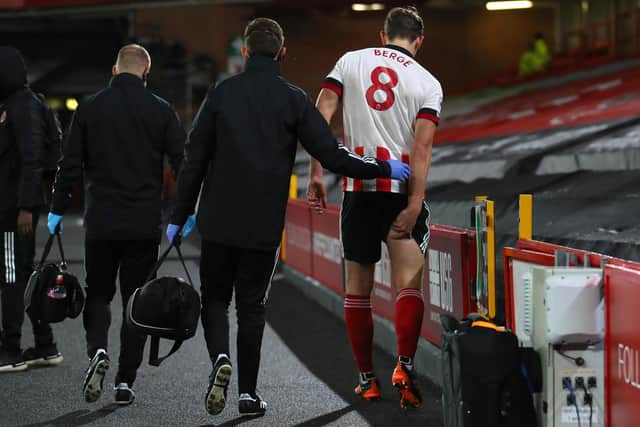Sander Berge has no concerns about Sheffield United return as Arsenal target's injury recovery is documented
and live on Freeview channel 276
The Norwegian missed a large chunk of United’s last Premier League season after damaging a hamstring against Manchester United being forced to go under the knife to reattach the muscle.
The midfielder, previously United’s record signing when he arrived in a £22m deal from Genk last January, then returned to play two games in May, but could not prevent the Blades from sliding out of the Premier League.
Advertisement
Hide AdAdvertisement
Hide AdThat relegation, and the subsequent large drop in income, meant that Berge was widely expected to head the departures from Bramall Lane this summer. But with the opening game of the season a week away, Berge remains a Blade and, speaking to United’s in-house media team for a feature on his rehabilitation, insists he can’t wait to return properly after an impressive 45-minute cameo against Doncaster Rovers earlier this week.
“I can’t wait,” Berge said. “Every day I check the schedule and I want to get the shirt on, it seems like I’ve missed so many games now.
“I believe I will be very fit and good when I return out there again.”
United’s media team followed Berge throughout his recovery from injury, including down to London for surgery and rehabilitation sessions in the gym and the pool.
Advertisement
Hide AdAdvertisement
Hide AdThe 23-year-old went under the knife just before Christmas, spending Christmas Day with teammate George Baldock with his family unable to visit the UK under Covid-19 lockdown rules, before beginning the long and arduous process to full fitness.
“I could tell I was injured in a split second,” Berge remembers of the injury, which looked innocuous as he went down under no challenge.
“Sometimes the toughest injuries can not feel as bad as they are. It didn’t feel great, and we were 1-0 ahead at the time so I wanted to carry on. But I knew early on that it wasn’t great.


“I had loads of messages on my phone, I spoke to my mum and dad and brother on FaceTime and spoke to my agent and close mates. They had all watched the game and knew it wasn’t good, either.
Advertisement
Hide AdAdvertisement
Hide Ad“In the first few weeks I couldn’t do much, I just tried to rest and ice it and repeat. Give it time to heal up. I did some upper body work and maintained a bit of fitness, and then I went away for some time off and refresh the mind with a change of scenery.”
Berge’s start to life in England was far from straightforward. He had been living in Sheffield for around six weeks when the coronavirus pandemic began and football was suspended. Berge and his teammates, who had got themselves into a position to challenge for a place in Europe when lockdown hit, were prescribed a tough physical programme to follow at home to ensure they would be in peak condition when football eventually resumed.
But United’s next game after lockdown was eventually over 100 days from their last, and they could not rediscover their pre-pandemic form to finish ninth in the table.


“It was the toughest schedule in terms of load and training,” Berge added. “We were seventh in the table going into lockdown and in a good place, so we wanted to build on that.
Advertisement
Hide AdAdvertisement
Hide Ad“We had two or three sessions most days and it was quite brutal, but it also made me mentally tougher coming into a new country. It was just me and myself at that time, in my apartment, putting in the work. So it was a tough period but I think I came out of it well, and it made me the man I am today.
“You never want to be injured, but sometimes it can be healthy to meet tough times. It makes you grow and makes you hungrier when you return. Makes you appreciate being a footballer more.
“It can put life into perspective a lot, to try and make the most of it. I have tried to get the most out of every session. Putting the work in physically is not a problem for me.
“The most struggle is when things don’t go in a straight line. There are always bumps in the road and small setbacks, and to be able to handle those mentally is the toughest part.
Advertisement
Hide AdAdvertisement
Hide Ad“You have to stick with it and think that you are closer to your goal with every day. But it’s not always easy to tell yourself that.”
To aid his recovery, Berge put himself through private sessions in a recovery pool, in the gym and on the pitch with a coach in London. At one point Berge is seen dunking a small basketball in the pool; his father, Asmund, chose basketball over football while his mother, Linnea, represented the Swedish basketball team in the 1970s. His brother Aksel also plays the sport to a high standard.
“The surgeon said the operation wasn’t a big thing, and is something people do quite often,” Berge added.
“It wasn’t a massive operation in any way but the job got done and it couldn’t have gone better, which is what you hope for.
Advertisement
Hide AdAdvertisement
Hide Ad“You don’t know how long it will take in those early weeks and months. But the goal, the aim, is always to be back playing.”
Comment Guidelines
National World encourages reader discussion on our stories. User feedback, insights and back-and-forth exchanges add a rich layer of context to reporting. Please review our Community Guidelines before commenting.